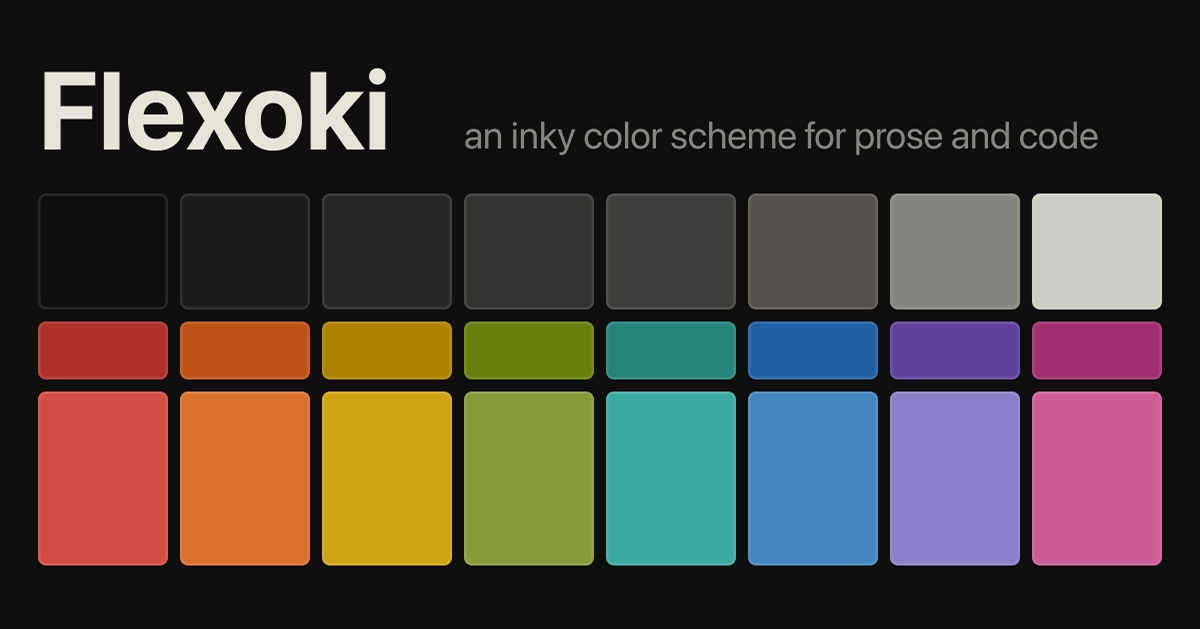
Details about Flexoki - Inky Color Scheme
Free, open-source color scheme for digital interfaces
Designed for reading and writing on screens
Inspired by analog inks and paper tones
Uses Oklab color space for cohesive vibrancy
MIT-licensed with ports for multiple apps
#What is Flexoki?
Flexoki is a free, open-source color scheme created by Steph Ango, aimed at enhancing the reading and writing experience on digital screens. Its primary goal is to bring the comfort of analog color—reminiscent of ink on paper—to emissive screens, making it ideal for developers, writers, and designers working on syntax highlighting, UI design, and prose.
The scheme draws inspiration from flexography, a printing process for paper, and uses the Oklab color space to maintain perceptual consistency while emulating the vibrancy of watercolor pigments, ensuring colors remain distinct and warm across light and dark themes.
#Features ⚡️
Analog-Inspired Colors: Mimics ink-on-paper aesthetics with warm paper tones and vibrant hues.
Extended Palette: Includes a full range of values (50 to 950) for every accent color, plus special paper and black values.
Light and Dark Modes: Offers both modes with exponentially increasing intensity for vibrant yet cohesive colors.
Syntax Highlighting: Optimized for code readability in editors like VS Code, Neovim, and Emacs.
Perceptual Consistency: Uses Oklab color space to balance lightness relationships across the spectrum.
Wide Compatibility: Available for apps like Obsidian, Figma, iTerm2, and Windows Terminal.
#Pros and Cons
#Pros ✅
Comfortable Aesthetics: Feels warm and familiar, reducing eye strain during long reading or coding sessions.
Free and Open-Source: MIT license allows unrestricted use and porting to other apps.
Vibrant Yet Balanced: Oklab ensures colors are distinct without looking washed out.
Community Ports: Already ported to tools like VS Code, Neovim, and Tailwind CSS by the community.
Artistic Approach: Balances scientific precision with artistic vibrancy, as noted by Steph Ango.
#Cons ⚠️
Perceptual Trade-Offs: Prioritizing distinctiveness can lead to slight inconsistencies in lightness.
Manual Porting Required: While MIT-licensed, porting to unsupported apps requires effort.
Niche Appeal: Analog-inspired design may not suit users preferring modern, high-contrast themes.
Limited Documentation: Lacks detailed guides for advanced UI applications beyond syntax highlighting.
#Included Components - Templates
Flexoki focuses on color schemes rather than traditional UI components:
Base Palette: Core colors for prose and code, including grayscale and accent colors (400/600 values).
Extended Palette: Full range of values (50-950) for UI design and complex projects.
CSS Variables: Defined in flexoki.css for easy integration into projects.
App Ports: Available for tools like Obsidian, VS Code, Neovim, and Figma, with community contributions.
#Pricing 💵
Flexoki operates on a Free model:
Free Access: Fully open-source under the MIT license, with no cost to use or modify.
#Integrations 🧰
Flexoki integrates with:
Tailwind CSS: Community-ported for Tailwind projects, as mentioned in posts on X.
Code Editors: Ports for VS Code, Neovim, Emacs, and iTerm2, among others.
Design Tools: Available for Figma, enabling designers to use the scheme in mockups.
Obsidian: Integrated as a theme, created by Steph Ango for his personal vault.
Web Projects: Used in Jekyll-based sites like stephango.com, compiled with Netlify.
Frequently Asked Questions
What is Flexoki, and how does it work with Tailwind CSS?
Flexoki is a free color scheme for digital screens, inspired by analog inks. It has been ported to Tailwind CSS by the community, allowing its colors to be used as Tailwind classes.
Is Flexoki free to use?
Yes, it’s fully free and open-source under the MIT license.
Can I use Flexoki with tools like Figma or VS Code?
Yes, Flexoki is available for Figma and VS Code, among other tools, through community ports.
Flexoki - Inky Color Scheme
An inky color scheme for prose and code.
Resource Types:
UI Kits :
Tailwind UITechnology Stack :
Have a product?
Submit your Shadcn product to AllShadcn, get featured, and drive genuine traffic while showcasing your work to the world. Turn your creativity into revenue and begin selling today! 🚀




